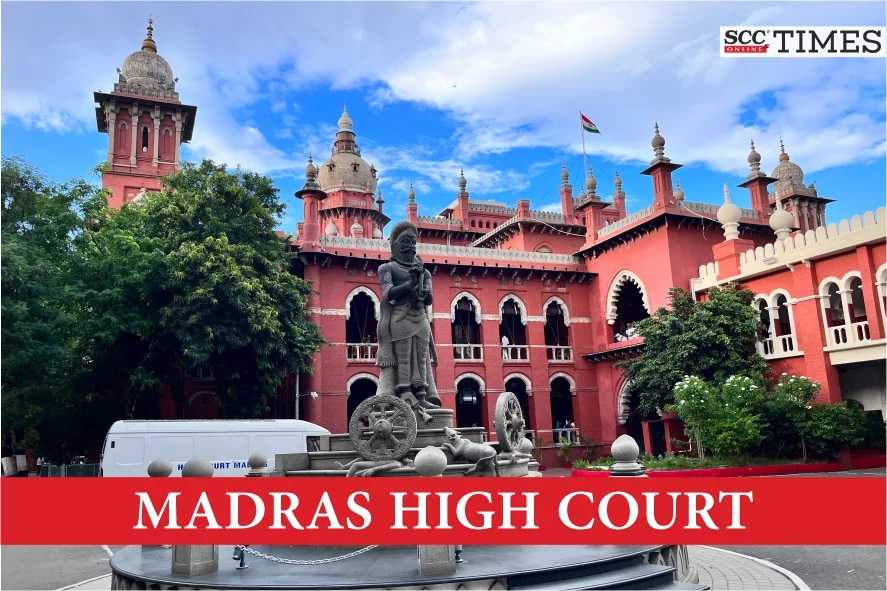Madras High Court: In a criminal revision filed under Section 397 read with Section 401 of the Code of Criminal Procedure, 1973 (‘CrPC’) praying to set aside the judgment passed by the Assistant Sessions Judge, for trial of criminal cases related to MP’s and MLA’s of Tamil Nadu and acquit Actor and Politician S.Ve. Shekher against the charges under Sections 504, 509 of Penal Code, 1860 (‘IPC’) and Section 4 of the Tamil Nadu Prohibition of Harassment of Women Act, 2002, P. Velmurugan, J. refused to interfere with the conviction of S. Ve. Shekher for making derogatory comments against women journalists.
Background
It is the case of the prosecution that S.Ve.Shekher had posted certain derogatory objectionable comment/message against women journalists in his Facebook social media posting and such message posting was done with an intention to humiliate and destroy human values of feminine gender, in the media field and thereby, public peace and tranquility was affected and therefore, he had committed the offence under various provisions of the IPC and the Tamil Nadu Prohibition of Harassment of Women Act. The investigating officer had initially filed the final report before IInd Metropolitan Magistrate and in view of S.Ve. Shekher being a a former Member of Legislative Assembly, representing Mylapore Constituency during the year 2006-2011, the case was thereafter transferred to the Assistant Sessions Court, Additional Special Court for trial of Criminal cases related to the elected MPs and MLAs of Tamil Nadu, Chennai.
Analysis and Decision
The Court noted that S. Ve. Shekher had forwarded a message on Facebook, but according to him, he did so without reading it, as the message was initially sent to him by someone else. He stated that upon receiving the message, he simply forwarded it without evaluating its content. However, after realizing the nature of the message, he immediately removed it from his account.
After perusing the entire cross-examination of the complainant, the Court said that it cannot be stated that S.Ve.Shekher was not aware of the contents of the message. Knowing fully well and knowing the consequences only, he had forwarded the same. Since there was agitation against the contents, he tendered an apology and removed the message from Facebook.
The Court highlighted that the matter clearly affects the reputation of the complainant, with the contents of the message focusing solely on her and other journalists, ultimately influencing those dependent on the information, such as family members and superiors. Upon a thorough review of the complainant’s cross-examination, the Court concluded that the offences committed by S. Ve. Shekher were established, and the prosecution has successfully proven its case beyond all reasonable doubt.
The Court stated that merely tendering an apology is not sufficient. Furthermore, according to the complainant, S. Ve. Shekher did not offer an unconditional apology directly to her, the victim. Instead, the apology was sent in a generic manner.
The Court remarked that merely tendering an apology would not be sufficient. Once the contents are released and seen by various individuals, it certainly tarnishes the image of the complainant and other journalists. A subsequent apology cannot erase the damage done to their reputations in the public eye. Therefore, this is a case where S. Ve. Shekher must be convicted. Furthermore, upon reviewing the entire material from the complaint, including the testimony of witnesses and documentary evidence, it is clear that S. Ve. Shekher committed the offence(s). There is no perversity in the appreciation of evidence, and there is no legal impediment to taking the complaint on file.
The Court stated that all the incriminating materials were presented to S. Ve. Shekher, which he denied. Therefore, there is no reason to interfere with the impugned judgment of the Trial Court. As with the appellate Court, the revisional Court is not required to re-appreciate the entire evidence independently.
The Court noted that the scope of a revision petition is very limited when exercising revisional jurisdiction. The revisional Court must assess whether there is any legal bar or any perversity in the appreciation of evidence. Considering the scope and objective of the revision, along with the facts and circumstances of the case, and after thoroughly reviewing the materials presented before the Trial Court, this Court found no reason to interfere with the impugned judgment. Accordingly, the revision petition was dismissed. The conviction and sentence imposed on S. Ve. Shekher by the Trial Court were confirmed.
The Court directed the Trial Court to secure the custody of S. Ve. Shekher in order for him to undergo the remaining period of his sentence, if applicable. Furthermore, the Police were instructed not to execute the sentence imposed on S. Ve. Shekher by the Trial Court, which has now been affirmed by this Court, until the expiration of the 90-day limitation period for filing a Special Leave Petition before the Supreme Court from the date of this order.
[S.Ve. Shekher v. State, 2025 SCC OnLine Mad 6, decided on 02-01-2025]
Advocates who appeared in this case:
For petitioner: Mr.Venkatesh Mahadevan
For respondent: Mr.S.Vinoth Kumar, Govt. Advocate








